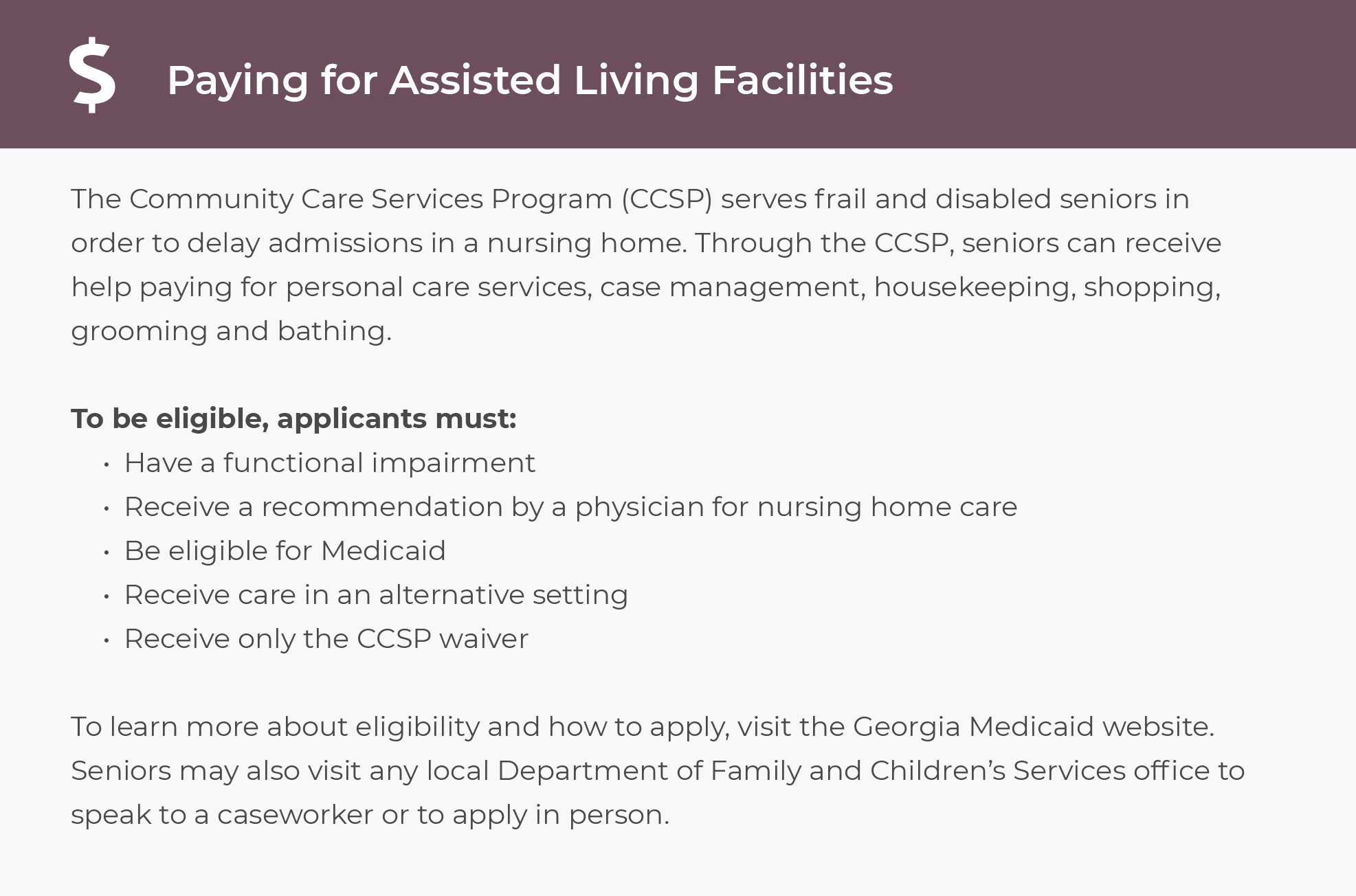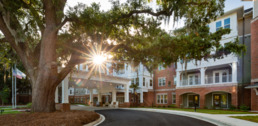Georgia’s coastal city of Savannah is home to more than 20,000 older adults, with almost 14% of its population consisting of people aged 65 or above. Warm temperatures throughout most of the year make it easy for active seniors to enjoy the city’s beaches, parks and historical attractions. The cost of living is lower than state and national averages, which can help retirees offset the higher-than-average income tax rates. Savannah has 273 doctors per 100,000 people, which is more than the national average of 210. Additionally, seniors have easy access to several hospitals and clinics, including Candler Hospital and St. Joseph’s Hospital.
Assisted living facilities provide care and support for older people who need help with day-to-day tasks, such as personal care, meal preparation or housework. It can be a great option for seniors who can no longer live alone but don’t need the high level of medical care provided by nursing homes. In Savannah, seniors typically pay around $3,513 per month for assisted living, which is similar to the statewide average of $3,535.
This guide offers an overview of assisted living care in Savannah, including average monthly care costs and local resources to help seniors as they age.
Hundreds of thousands of American seniors utilize assisted living, a figure that is only growing. For these seniors, assisted living combines residential housing,assistance in daily activities, and some healthcare. These communities also strive to provide an atmosphere that is comfortable and engaging for their residents… Read More >
COVID-19 restrictions and rules for Assisted Living Facilities are typically set by the state – to see the rules in your state, you can read our guide to Assisted Living in Georgia. Keep in mind that there may be other policies that communities put in place to protect their residents, so you should contact your local community for more information. Additionally, you can contact your local Area Agency on Aging to learn more – find contact information here.
According to the 2021 Genworth Cost of Care Survey, the average monthly cost of assisted living in Savannah is $3,513.
With just a $22 difference between the average costs of assisted living in Savannah and across Georgia, Savannah is on par with the statewide average of $3,535. Seniors in Savannah save almost $1,000 per month as compared to the national average of $4,500.
Assisted living costs vary significantly throughout Georgia. Around 80 miles south of Savannah, Brunswick has some of the state’s highest prices for assisted living care. At $5,300 per month, this is almost $1,800 more than in Savannah. The lowest costs are typically found in the center of the state, with average rates of $2,750 and $2,860 in Warner Robins and Macon, respectively. Costing around $3,845 per month, assisted living in the state capital of Atlanta is a little more expensive than in Savannah. Seniors also pay more in Augusta, Athens and Columbus, where median monthly fees are $3,606, $4,184 and $4,223, respectively.

Since not everyone can afford to pay for assisted living out-of-pocket, it’s important to find alternative methods to help make assisted living more affordable. Some of these options include:
For more information about your options for making assisted living more affordable, visit our guide to Assisted Living in Georgia.
|
Resource |
Contact |
Service |
|
(866) 579-2116 |
The nonprofit Senior Citizens Inc. aims to support seniors through various programs and supportive services. Active adults aged 55 or above can sign up to volunteer with the Senior Companion Program, which provides assistance to homebound seniors. If you have an interest in ongoing education and are 55 or above, The Learning Center at Skidaway Island is ideal. You can sign up for a range of low-cost courses and join special interest groups and social activities. Older adults can use the volunteer-run Sterling Rides program for low-cost door-to-door transportation for medical appointments and shopping trips. | |
|
(800) 580-6860 |
Part of the Coastal Regional Commission of Georgia, the Coastal Georgia Area Agency on Aging connects seniors to local, statewide and national aging-related resources. It has a technology lab where older individuals can try new assistive technology and operates a robust health and well-being program, including fall prevention and diabetes self-management, for those aged 60 and above. | |
|
(888) 257-9519 |
Operated by Atlanta Legal Aid and available statewide, Georgia Senior Legal Hotline provides free advice to people aged 60 and above on diverse civil legal issues. Topics include consumer affairs, benefits, pensions, debt, insurance, abuse and housing. The organization also advocates for elder and disabled rights. | |
|
(912) 352-4405 |
Costing just $18 per year, members of the SmartSenior Program can enjoy a range of practical benefits, including Medicare counseling, computer training, health screenings and health education. Members can also join a variety of activities geared toward life enrichment and well-being, such as line dancing, bingo and seasonal events, and take advantage of discounts on travel, retail and dining. | |
|
(912) 651-2192 |
Provided by the City of Savannah, the Golden Age Program is available at the Mary Flournoy Golden Age Center and several city-wide community centers. For a nominal yearly fee, adults aged 55 and above can enroll in the program to join diverse recreational and educational activities. Schedules include sewing classes, lectures, line dancing, exercise sessions, bingo, local excursions, music, checkers club and devotional discussions. Members aged 60 and above can enjoy free meals while attending center activities. | |
|
(931) 338-2891 |
The nonprofit Team Savannah for Veterans provides tailored assistance and support to improve the lives of local veterans. It provides a peer support network of veterans. |
Assisted Living Facilities in the Savannah area are required to follow a set of rules and regulations that are determined at the state level. For an overview of those rules and regulations, see the information below. For more specific information, talk with your local community or Area Agency on Aging.











